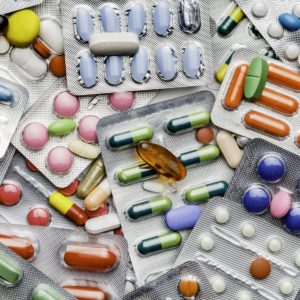
The turbulent economic challenges in Ghana currently, and its ravaging effects on businesses and livelihoods has generated much concern. The developments at the macro-economic level and the negative impact on pharmaceutical products and services require drastic decisions to be taken to save the pharmaceutical industry. It is on the basis of this economic impact on the industry that the National Councils of the Ghana National Chamber of Pharmacy (the Chamber), the Pharmaceutical Manufacturers Association of Ghana (PMAG) and the Pharmaceutical Importers and Wholesalers Association of Ghana (PIWA) jointly met in an emergency meeting on the 10th October, 2022 to discuss strategies needed to stem the tide and to save the industry from collapse.
Amongst some macro-economic indicators identified as having deleterious effect on the smooth running of pharmaceutical business in Ghana included:
The past year the exchange rate of the Cedi to the Dollar has risen from GHC5.80 to GHC13.90 and still continues to rise. This means that importers of finished pharmaceutical products, manufacturing inputs and equipment for pharma operations will need more Cedis for their operations. For example; if GHC580,000.00 was needed to import a consignment of medicines which costs $100,000 as at the end of 2021, a GHC1,390,000.00 will be needed to buy the same consignment of medicines today. So an extra amount of GHC810,000.00 is required as top up over last year’s money. This confirms the ravaging nature of the Cedi devaluation and its direct impact on pharmaceutical operations.
The pharmaceutical industry is credit driven. Public sector pays on the average 6–12months because of delayed payments from the National Health Insurance Scheme (NHIS). Majority of private sector facilities make payments for all supplies within 3-4months. In the current circumstances of daily devaluation of the Cedi it is imperative to state that pharmaceutical supplies on credit under these terms has led to erosion of operational capital of pharmaceutical importers and manufacturers.
Current inflation rate stands at 37.2%. This obviously brings about increase in the cost of goods and services by the same quantum. The cost of essential accessories and other inputs needed for pharmaceutical operations therefore becomes affected.
Interest rates on loans contracted from commercial banks as at end of last year was approximately 27% and currently stands at 35% on a compounding scale. This means charges on loans to finance operations have escalated. Additionally, loans from commercial banks attract an extra 5% penal rate on default. The delays in payments affect liquidity and ability to service loans with the consequence of likelihood of default in loan payments.
Cumulative fuel price increase from beginning of the year till date stands at 71%. Typical public sector business always has a caveat of “last-mile-delivery” which means that suppliers are contract bound to deliver all orders to the respective warehouses/approved storage sites of the MOH/GHS across the country. Increases in fuel prices affect transport costs and hence undertaking last-mile-deliveries increase the cost of operations.
Cost of utilities according to Public Utilities and Regulatory Commission (PURC) from 1st September, 2022, has increased by 27% for electricity and 21% for water. Evidently, electricity and water remain indispensable in the conduct of pharmaceutical businesses and hence their increase tend to affect the cost of doing business highly.
The Benchmark Value Discount Policy was introduced in April, 2019 by government in an attempt to make the Ghanaian Ports competitive, reduce smuggling and increase governments revenue from the port. Along the year 2022, benchmark values for imported medicines was reversed from 50% to 30% resulting in payment of more taxes at the port of entry for all imported pharmaceutical products. This means importers of finished pharmaceutical products are made to pay 70% of applicable taxes on medicines instead of the 50% they used to pay. Interestingly all these statutory taxes paid to government agencies are all PAID IN CASH. It is also important to state that the reversal of the discount on benchmark values has negatively impacted the cost of doing pharmaceutical business in Ghana.
Much as the above-mentioned economic indicators affect prices of general goods and services, the effect on medicines prices will not only result in challenges with medicines availability and accessibility, but most importantly the quality of life of Ghanaians because they cannot afford the resultant high cost of medicines.
On the industry front, interest in continuous investment in official and approved pharmaceutical business is waning. Very soon a sizeable number of industry players may be forced to fold up or lay off staff. This becomes a dangerous recipe for criminals to engage in their nefarious activities and flood the market with fake and substandard products, which eventually tends to compromise quality and efficacy of such medicines, thereby putting the health of all Ghanaians at risk.
The Chamber, PMAG and PIWA therefore call for an immediate action to save the industry.
• NO CREDIT POLICY FOR ALL BUYERS IN THE INDUSTRY
All transactions, with immediate effect, shall be on CASH BASIS until the economy stabilises.
RECOMMENDATIONS
1. The NHIS and all Private Health Insurance companies are encouraged to give accredited facilities seed funds to buy medicines on CASH for supplies to patients under the Schemes.
2. All end user institutions (retail pharmacies, private hospitals and clinics) are encouraged to secure loans from banks to buy medicines on CASH.
3. The Ministry of Finance and Economic Planning (MOFEP) should release funds immediately to pay for the long-standing debts (Over 9months) and to push to clear all overdue debts.
4. The Ghana Statistical Service is advised to include medicines amongst the basket of items used for the Consumer Price Index (CPI) calculations. Such an adjusted CPI will display a better inflation rate for planning and strategy for the pharmaceutical sector.
5. The MOH/GHS and NHIS should as a matter of urgency meet with the leadership of the above Associations to discuss possible financial reengineering to save the situation.
The Chamber, the PMAG and PIWA implore all stakeholders and the general public to understand and support this initiative, in these trying moments, to save pharmaceutical businesses from imminent collapse.
By uniquenewsgh.com
End.
 Uniquenewsgh.com News, Politics, African News Updates & More
Uniquenewsgh.com News, Politics, African News Updates & More



